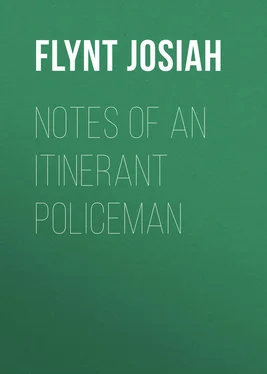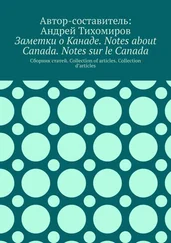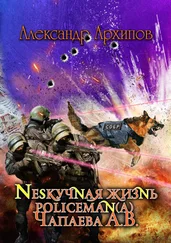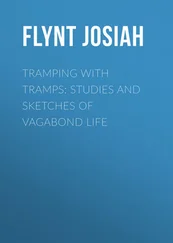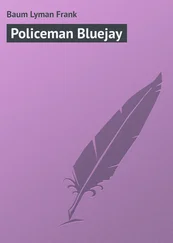Josiah Flynt - Notes of an Itinerant Policeman
Здесь есть возможность читать онлайн «Josiah Flynt - Notes of an Itinerant Policeman» — ознакомительный отрывок электронной книги совершенно бесплатно, а после прочтения отрывка купить полную версию. В некоторых случаях можно слушать аудио, скачать через торрент в формате fb2 и присутствует краткое содержание. Жанр: foreign_antique, foreign_prose, на английском языке. Описание произведения, (предисловие) а так же отзывы посетителей доступны на портале библиотеки ЛибКат.
- Название:Notes of an Itinerant Policeman
- Автор:
- Жанр:
- Год:неизвестен
- ISBN:нет данных
- Рейтинг книги:4 / 5. Голосов: 1
-
Избранное:Добавить в избранное
- Отзывы:
-
Ваша оценка:
- 80
- 1
- 2
- 3
- 4
- 5
Notes of an Itinerant Policeman: краткое содержание, описание и аннотация
Предлагаем к чтению аннотацию, описание, краткое содержание или предисловие (зависит от того, что написал сам автор книги «Notes of an Itinerant Policeman»). Если вы не нашли необходимую информацию о книге — напишите в комментариях, мы постараемся отыскать её.
Notes of an Itinerant Policeman — читать онлайн ознакомительный отрывок
Ниже представлен текст книги, разбитый по страницам. Система сохранения места последней прочитанной страницы, позволяет с удобством читать онлайн бесплатно книгу «Notes of an Itinerant Policeman», без необходимости каждый раз заново искать на чём Вы остановились. Поставьте закладку, и сможете в любой момент перейти на страницу, на которой закончили чтение.
Интервал:
Закладка:
As a man, separate from his business, "Whitey" was what most persons would call a good fellow. He was modest, always willing to do a favour, and everybody seemed to like him. During our companionship we never had a quarrel, and he helped me through many a strait. I have seen him once again since the first meeting. He was not quite so well dressed as formerly, and his health seemed to be breaking up, but he was the same good fellow. In late years I have not been able to get news of him beyond the rumour that he was dying of consumption in Mexico.
The menace of the tramp class to the country seems to me to consist mainly in the example they set to the casual working man, – the man who is looking around for an excuse to quit work, – and in the fact that they frequently recruit their ranks with young boys. It is also to be said of them that they are often in evidence at strikes, and take part in the most violent demonstrations. As trespassers on railroads they are notorious; they are a constant source of trouble to the railroad police officer. Strictly speaking, the majority of them cannot be called criminals, although a great many of them are discouraged criminals, but in the chapter dealing with "The Lake Shore Push" it will be seen how ferocious some of them become.
The next largest class is composed of what I call backwoods criminals. Scattered over the country, in nearly every State of the Union, are to be found districts where people live practically without the pale of the law. These places are not so frequent in the East as in the West, in the North as in the South, but they exist in New England as well as in Western States. They are generally situated far away from any railroad, and the inhabitants seldom come in touch with the outside world. The offenders are mainly Americans, but of a degenerated type. They resemble Americans in looks, and have certain American mental characteristics, but otherwise they are a deteriorated collection of people who commit the most heinous offences in the criminal calendar without realising that they are doing anything reprehensible. I have encountered these miniature "Whitechapels" mainly on my excursions in tramp life, but I had to be on the lookout for them during the police experience. In one of the States which my "beat" traversed, I was told by my chief that there was a number of such communities, and that they turned out more criminals to the population in a year than the average large city. One day, while travelling in a "caboose" with a native of the State in question, I asked him how it came that it tolerated such nests of crime, but he was too loyal to admit their existence. "We used to have a lot of them," he explained, "but we've cleaned them up. You see, when we discovered natural gas, it boomed everything, and we've been building railroads and schools all over. No; you won't find those eyesores any more; we're as moral a State to-day as any in the Union." It was a pardonable pride that the man took in his State, but he was mistaken about the matter in question. There are communities not over a hundred and fifty miles from his own town where serious crimes are committed every day, and no court ever hears of them because they are not considered crimes by the people who take part in them. Not that these people are fundamentally deficient in moral attributes, or unequal to instruction as to the law of Mine and Thine, but they are so out of touch with the world that they have forgotten, if indeed they ever knew, that the things they do are criminal.
It is impossible at present to get trustworthy statistics in regard to this class, because no one knows all of its haunts, but if it were possible, and the entire story about it were told, there would be less hue and cry about the evil that the foreigners among us do. I refer to the class without advancing any statistics, because it came within my province as a police officer to keep track of it, and because it had attracted my attention as an observer of tramp life; but it is well worth the serious consideration of the criminologist.
The professional criminal, or the habitual offender, as he is called by some, comes next in numerical strength, but first of all, in my opinion, in importance. I consider him the most important because he frankly admits that he makes a business of crime, and is prepared to suffer any consequences that his offences may bring upon him. It is he who makes crime a constant temptation to the occasional offender, and it is also he with whom we have the most trouble in our criminal courts; he is almost as hard to convict as the man with "political influence." On my "beat" he was more in evidence, in the open at least, than any of the other offenders mentioned, except the tramp, but, as I stated, the warm months are the time when he comes out of his hiding-places, and it was natural that I should see a good deal of him.
My fifth category is made up of what a friend calls "the unknown thief," whom he considers the most dangerous and despicable of all. He means, by the unknown thief, the man in official life, or in any position which permits of it, who protects, for the sake of compensation, the known thief. "If you will catch the unknown thief," he has frequently said to me, "I will contract to apprehend and convict the known," and he believes that until we make a crusade against the former, the latter is bound to flourish in spite of all our efforts. He sees no use, for instance, in spending weeks and sometimes months in trying to capture some well-known criminal, as long as it is possible for the man to buy his freedom back again, and it is his firm belief that this kind of bargaining is going on every day.
Although there was no doubt that the unknown thief was to be located on any "beat," if looked for, my instructions were not to disturb him unless he seriously disturbed me, and as he made no effort to interfere with my work I merely made a note of his case when we met, and doubtless he also "sized me up" from his point of view. How strong his class is, compared with the others, must remain a matter of conjecture, but I have put his class fourth in my description because it is the quality of his offences, rather than their quantity, which makes his presence in the criminal world so significant. There are those who believe that he is to be found in every town and village in the United States, if enough money is offered him as bait, but I have not sufficient data to prove, or to make me believe, such a statement. The league between him and the known thief – the man whose photograph is in the "rogue's gallery" – is so close, however, that I have devoted special chapters to both offenders.
Of the last category, the man whom I have called the irresponsible criminal, there is not much of interest or value that I have to report. While acting as police officer I practically never encountered him in the open, and the few members of his class that I saw in prisons seemed to me to have become irresponsible largely during their imprisonment. Perhaps I take a wrong view of the matter, but I cannot get over the belief that the majority of offenders, particularly those who are ranked as "professionals," are compos mentis as far as the law need require. In every department of the prisons that I visited, men were to be seen who gave the impression of being at least queer, but they formed but a very small part of the prison population, and may very possibly have been shamming the eccentricities which seemed to indicate that they were on the border line of insanity. For this reason, and, as I say, because I met none in the open, it has seemed fair to put this class last.
The foregoing classification is naturally not meant as a scientific description in the sense that the professional criminologist would take up the matter. I have merely tried to explain how the criminal situation in the United States seems to the man whose business it is to keep an official watch over it. I may have overlooked, in my classification, offenders that some of my brother officers would have included, but it stands for the general impression I got of the criminal world while in their company. To attempt to estimate the numerical strength of these classes as a whole would land one in a bewildering bog of guesses. It is only recently that we have made any serious effort to keep a record of offenders shut up in penal institutions, of crimes which have been detected and of offenders who have been punished, and it is a fact well known in police circles that there is a great deal of crime which is never ferreted out. There is consequently very little use in trying to calculate the number of the entire criminal population. The most that I can say in regard to the question is that never before has this population seemed to me to be so large, but I ought to admit that not until my recent experience have I had such an advantageous point of view from which to make observations.
Читать дальшеИнтервал:
Закладка:
Похожие книги на «Notes of an Itinerant Policeman»
Представляем Вашему вниманию похожие книги на «Notes of an Itinerant Policeman» списком для выбора. Мы отобрали схожую по названию и смыслу литературу в надежде предоставить читателям больше вариантов отыскать новые, интересные, ещё непрочитанные произведения.
Обсуждение, отзывы о книге «Notes of an Itinerant Policeman» и просто собственные мнения читателей. Оставьте ваши комментарии, напишите, что Вы думаете о произведении, его смысле или главных героях. Укажите что конкретно понравилось, а что нет, и почему Вы так считаете.
